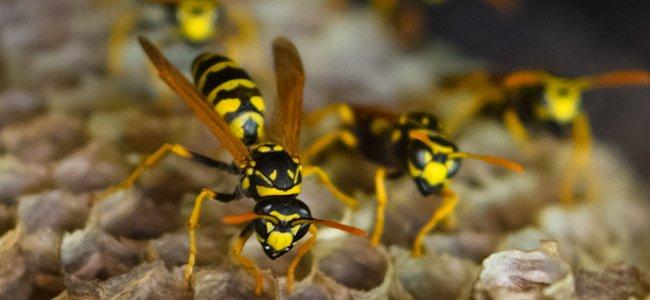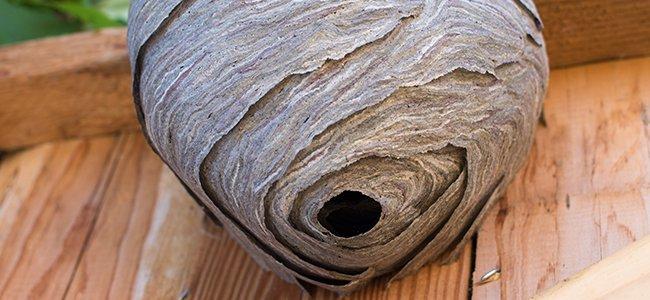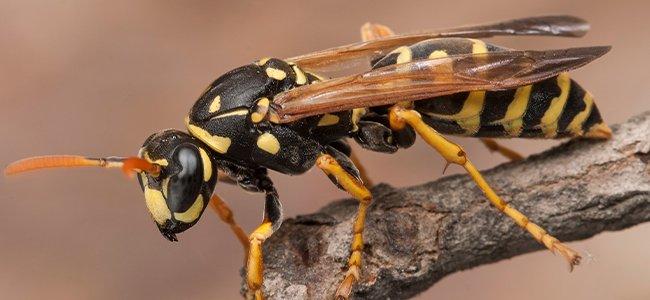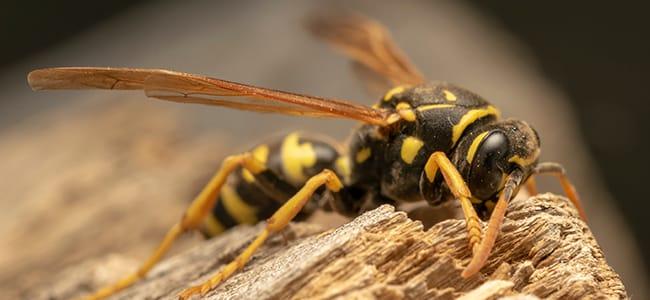
How To Keep Wasps Away From Your Washington D.C. Yard
08/23/2021
Stinging insects are extremely dangerous pests here in Washington D.C. For aggressive varieties such as wasps, home and business owners find themse...
READ MORE >

Spending time in your Maryland yard is one of the best things about living here. Whether you’ve created a backyard oasis or enjoy rocking on the front porch, it’s a wonderful feeling to be able to relax on your own property. Unfortunately, some pests make that difficult to do.
If there are a lot of hornets buzzing around your property, they can make it hard to spend time outdoors from spring, through summer, and all the way into the fall. Although there are several types of stinging insects in Maryland, they are not all the same, and hornets can be especially dangerous. Learning a little about them can help you make informed decisions about how to deal with these stinging insects on your Maryland property.
Hornets are a type of wasp. Although there are 20 species of hornets, the species you're likely to find in Maryland is the European hornet. They get their name because they were introduced to the United States from Europe in the 1800s.
European hornets are known for their large size. They can grow up to an inch and a half in length. They have long bodies that taper to a point, six legs, a set of antennae, and two pairs of wings. Their heads are a reddish-brown color that gradually becomes browner on their thorax, while their abdomen is striped with yellow and brown markings. Although they do have hair on their bodies, it is easily missed by the naked eye, which gives European hornets a somewhat bare, shiny appearance, which is very different from furry bumblebees.
Although they enjoy tree sap and will even eat leaves, European hornets are not vegetarians. They often feed on other insects, including flies, bees, grasshoppers, and more.
European hornet nests are made of chewed up wood and cellulose. They prefer to build their nests in hollowed out trees, inside walls, or in quiet buildings, like barns or attics. If they build their hives out in the open, they’ll cover the outside in a papery envelope to protect them from the elements.
The social structure of European hornets is well-developed and highly organized. One queen rules the nest, and she is the only female that can reproduce. There are few males in a colony, and they serve the function of mating with the queen. The males typically die soon after fulfilling their duties.
The majority of the members of the hive are non-reproducing females. They serve the many needs of the colony, including gathering food, taking care of the young, constructing the hive, and protecting the colony.
As fall turns to winter each year, every hornet in the colony dies off except for the new queens and their eggs. These young queens find places where they can shelter and survive through the winter. Then, in the spring they will come out, begin to build a new nest, and lay their eggs. Once the eggs hatch and mature into worker hornets, they take over the duties of building the nest and finding food so that the queen can focus solely on her main mission of reproducing. As the summer ends and fall returns, the older queens lay eggs that become the new queens before dying off with the rest of the colony.
While no one wants to have a close encounter with any type of stinging insect, hornets can often be the worst of all. As the largest species of wasp, European hornets can deliver a powerful and painful sting when they feel threatened.
Furthermore, contrary to popular belief, hornets do not only sting once. While bees have a barbed stinger that gets stuck and leads to the bee’s death after a sting, hornets have smooth stingers. This allows them to sting an unlucky recipient multiple times.
Anyone who gets stung will quickly understand how painful a hornet sting can be, but for many people, there is a real danger to their health when they get stung. Many people have allergies to stinging insects. Some experience mild symptoms after a sting, such as swelling at the injection site. Most people experience moderate symptoms, such as breaking out in hives. Others, however, experience severe symptoms, such as difficulty breathing. In severe cases, if immediate action isn’t taken, anaphylaxis can occur and the victim can die.
While cases of people dying from a hornet sting may be rare, they are certainly not unheard of. Even if a sting only leads to mild or moderate symptoms, no one wants to go through the pain and worry associated with such an event. The far better outcome would be that the sting doesn’t occur in the first place.
Although stings are usually the first thing people think about when discussing the dangers of hornets, they do pose another threat to Maryland properties. Hornets can cause serious damage to the trees and shrubs on your property. Not only do they strip bark from trees to get at the sap underneath, but they also use tree fibers to build their nests. Although this is a secondary concern to the health of your family, it is worth considering if you want your foliage to remain healthy.
In order to prevent hornets and their stings, there are several things you can do. Knowing how to behave when hornets are present is important so that you don’t aggravate them or make them feel threatened. Knowing how to make yourself and your home a less appealing place to spend time is important so that you have fewer hornets on your property. Knowing how to get rid of a hornet infestation is important so that you don’t end up in a very bad situation.
Like most animals, hornets are not typically looking for a fight. They would much rather avoid conflict if given the choice. However, if they feel threatened, they will not hesitate to sting.
If you have a hornet buzzing around you, the most important thing you can do is stay calm. Freaking out or waving your arms wildly around your head will only serve to antagonize the hornet, making it more likely to sting you. Instead, stay calm and walk away at a brisk pace. The hornet may follow you at first, but usually, it will lose interest and leave you alone.
It’s also wise to avoid areas where hornets are likely to be present. For instance, if you see a nest, keep your distance. Hornets will be most aggressive there because they instinctively do anything they can to protect their home. If you see hornets buzzing around your flower garden, it’s probably not the best time to stop and smell the roses. Choose a different time to gather flowers for a bouquet.
Preventing a queen hornet from building her nest on or near your property isn’t always possible, but you can take steps to make the area around your house as unappealing as possible to a new queen looking for a place to build her home.
First, try to eliminate, fill, or cover areas where she may try to build her nest. Rotted out trees are a favorite spot for hornets, as are wall voids and empty shelters. By cutting down dead trees, sealing holes, cracks, and crevices around the exterior of your house, and preventing entry to sheds, barns, and garages, you can make it difficult for a queen to find a suitable location for her hive.
Limiting the food and water sources around your home will also help make your Maryland property unappealing to hornets for both the queen while looking for a place to build her nest and the worker hornets as they go about their duties in the spring, summer, and fall.
Limit water sources by:
Limit food sources by:
As far as making yourself less appealing to hornets, there are a couple of things you can do. Although opinions are mixed about whether certain colors attract hornets, there is some evidence that they are drawn to yellow, so you may want to avoid wearing that color if you want to avoid hornets.
It’s also wise to avoid wearing perfumes, colognes, or other scented items. Sweet scents can attract hornets that think you are a potential food source.
If you are seeing hornets all over your property, it’s safe to say that you have a hornet infestation. Regardless of whether you’ve seen the hive or not, seeing a lot of hornets around your Maryland home is a cause for concern. Hornets are dangerous and you don’t want to risk the safety of your family or feel like you have to stay inside during the nicest months of the year.
Getting rid of a hornet infestation is not an easy task, and it’s not one that should be attempted on your own. While being stung by one hornet is bad enough, imagine the pain and suffering that can come when a swarm of angry hornets attacks you for trying to remove their nest.
Instead, the best way to eliminate a hornet infestation is to contact the professionals at American Pest. We have the knowledge, equipment, and skills necessary to fully and safely eliminate your hornet problem.
We begin with an inspection to identify the location of the hive. We then treat the hive with a product that is suited for European hornets. If possible, once it’s safe to do so, we’ll remove the nest. Finally, after the treatment, we’ll follow up with you to make sure the problem has been fully addressed or to see if further treatment is necessary.
Hornets in Maryland are dangerous, but they don’t have to be a problem on your property. Let American Pest safely eliminate your European hornet infestation so that you can enjoy your yard with peace of mind, knowing you and your family won’t need to worry about getting stung. Contact us today.

08/23/2021
Stinging insects are extremely dangerous pests here in Washington D.C. For aggressive varieties such as wasps, home and business owners find themse...
READ MORE >

06/27/2021
Some pests are so harmless that you almost feel bad for getting rid of them. Wasps, on the other hand, only cause relief when they’re gone. S...
READ MORE >

04/09/2021
Keeping your yard a safe and pleasant place to spend time, free of wasps and hornets, doesn’t just happen by itself. It takes thought and act...
READ MORE >

Protect your home and family from nuisance and potentially damaging pests with a Preferred Care home pest control plan. Starting at $49/month

Don't let the bed bugs bite a second longer. Contact American Pest for the most comprehensive bed bug control in the industry. Learn More

Our certified rodent control pros will put an end to your frustration by getting rid of rats and mice inside your home. Learn More

Say goodbye to wood-destroying termites in your home when you contact American Pest for expert termite control. Learn More

Trust American Pest to deliver professional backyard tick control services that are guaranteed to get results. Learn More

Don't spend the warm-weather season indoors, find out how American Pest's professional treatments get rid of mosquitoes. Learn More
Fill out the form and recieve feedback in less than 5 minutes. For immediate service please call.